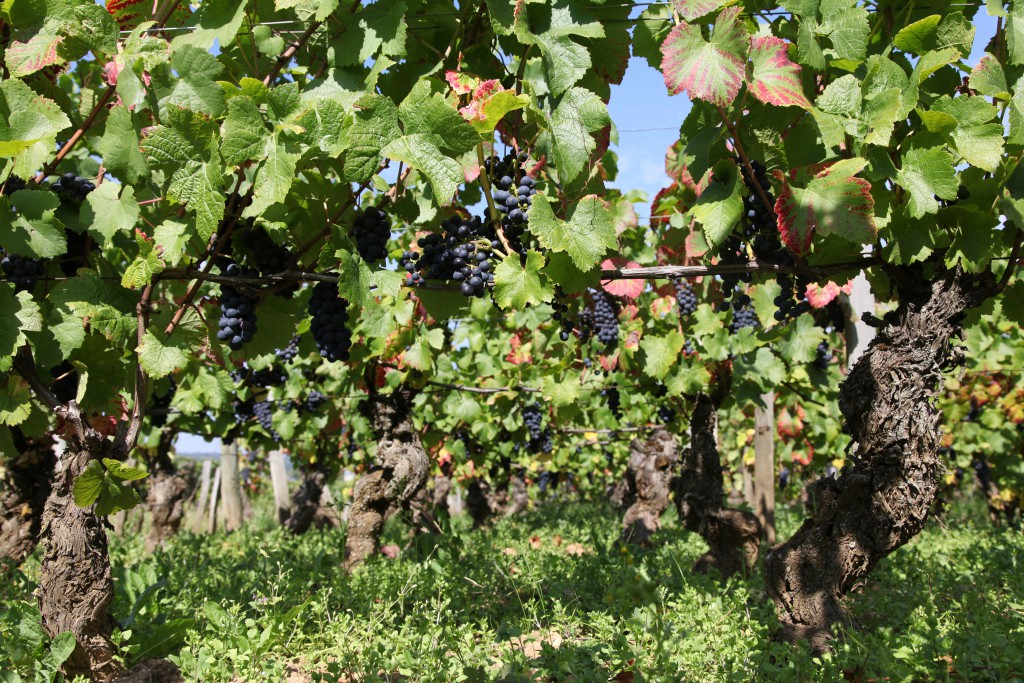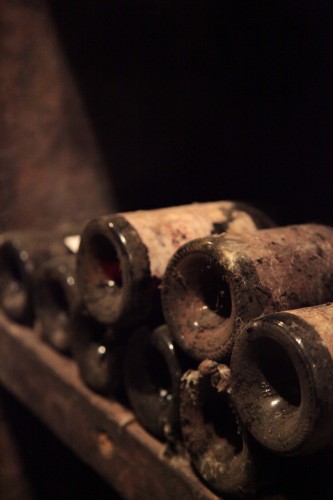Domain and philosophy by Pascal Mugneret
Pinot Noir, the Terroir, the Winemaker, the Wine…
Firstly, I am particularly fond of the term vigneron, because it always makes one think of the earth, of the good instincts of a farmer: those of observation, those of our grandparents, those that we have such a hard time finding in our modern era.
For me, the vigneron is simultaneously the best friend, the confidant, the family doctor, the protector of an unprecedented pairing: that of Pinot Noir and the nourishing earth, the terroir. This pairing is perennial, lasting decades, centuries, but is nonetheless fragile. Our predecessors came, strived to create, and bestowed upon these two elements both strengths and weaknesses. These weaker characteristics may be inherent or ingrained in the terroir, but may also be acquired: the influence of generations of prodigious care by vignerons, year after year.
Each season, from the falling of the leaves the year before to the harvest of that year, is a new pregnancy between the couple of Pinot Noir and Terroir. If the climate is relatively mild, if the efforts of the vigneron are carried out attentively and respectfully, the pregnancy will come to term under good conditions.
Vine management is thus a skillful blend of actions (plowing, pruning, de-budding, tying-up of the vines…) for which the dates and the ‘doses’ are very important, requiring moments of contemplation in order to stay on the right path. We are always seeking precision in order to provide the best support that we can to our vines… Like a father might be with his children, with their successes and their disappointments… humility ought to be the greatest quality of a vigneron.
Harvest time is when the new-born is finally ready to come into the world. Upon arrival to the cellar, the grape, the fruit of the union between Pinot Noir and Terroir, is still a multi-cellular being without much coherence (everything is separated: the juice, the anthocyans, the aromatic precursors, the tannins…). Vinification, or more precisely alcoholic fermentation, is at the heart of the viticultural maternity ward, corresponding to the moment of childbirth. As soon as there are no remaining fermentable sugars, the wine sees the light of day, raw but already coherent, the features will quickly become finer in the days that follow, especially during racking (the heaviest and least noble sediments will drop down to the bottom of the tank).
The child will then leave the maternity ward to rejoin his adoptive family, his caring father, the vigneron, and it is in barrels, specially chosen, that this newcomer will be raised. It is the beginning of aging: the childhood of the wine. Quickly the wine will assert itself and mature; the child will grow.
Next adolescence comes, more or less quickly: the wine’s malolactic fermentation. We have a harder time recognizing the child we used to know, but, if the adoptive father knows how to again be both patient and attentive, this rough patch will pass and the turbulent teenager will mature into a young adult that asserts himself. We will once again find the character traits of his original parents (Pinot Noir and Terroir), the bloodlines of earlier vintages will become evident; even though this young individual will be unique, he is the bearer of a history, a heritage.
The day will come when a certain balance is achieved and the wine is ready: ready to move away from the firm, but fair authority of its adoptive father who gave all his heart so that a certain harmony would inhabit the wine. The big day is that of bottling, when the wine becomes an adult, the day when the wine will begin to live its own life.
Of course, for some time the wine will stay sheltered in the cellar, will still be protected for a bit longer. But finally, when the wine leaves, it will have a life more or less fulfilled depending on the hazards it will face (storage conditions, the quality of the cork, the formation of a light deposit, etc.) but also depending on the conditions of its birth, when it was just a grape, and the values with which it was raised (the style, the personal touch of the winemaker).
Not all wines are exceptional, meant to cellar for years… Just as not all people are beautiful, rich, strong, and intelligent. But each one of us brings something to the table, each wine tells a story, a story that must be told early on if the wine has had a difficult birth, and yet a story that we will revisit over and over again over the years so that its meaning will be that much more beautiful.
We should never compare wines, just as we should never compare people.
Wines are like people, they must be accepted for who and what they are, nothing more, nothing less. In this sense, there will be more or less affinity between the wine and the person that tastes it; this affinity can bring about very strong emotions. These feelings are born out of a certain context; one must be open when preparing to uncork a bottle, whether it is just for oneself, for a pair, or to share with friends. Wine is the spark of these moments when time stops, a moment of grace when everything seems to be in harmony: the people, the place, the instant. One always manages to remember the wine that one has experienced in such moments.
Wine, a climatic memory of a place brought to us by the vine.
Wine, the bearer of memories of precious moments shared with friends.





